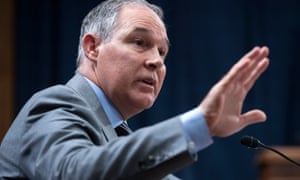Figures released by the EPA show that 115 crime cases were opened in 2017, down from a peak of nearly 400 in 2009
Figures released by the EPA show that 115 environmental crime cases were opened in the 2017 financial year, down from a peak of nearly 400 in the 2009 financial year, which was largely under the Obama administration.
A total of $1.6bn in new penalties were levied against polluters in 2017, in the fiscal year that ended 30 September. This was around a fifth of the $5.9bn instigated by the Obama administration in 2016 but still higher than any other year stretching back to 2007.
The EPA pointed to the $1.2bn it secured from private entities to clean up superfund sites, toxic areas that have been abandoned by polluting industries, and said that a total of $2.98bn had been levied in criminal fines, restitution and court-ordered projects. These cases, the EPA said, reduced or eliminated 217m pounds of air pollution and 412m cubic yards of contaminated water.
“A strong enforcement program is essential to achieving positive health and environmental outcomes,” said Susan Bodine, EPA assistant administrator for enforcement. “In fiscal year 2017, we focused on expediting site cleanup, deterring noncompliance, and returning facilities to compliance with the law, while respecting the cooperative federalism structure of our nation’s environmental laws.”
Cynthia Giles, who headed the EPA enforcement office under Obama, estimated that Scott Pruitt, the EPA administrator appointed by Trump, is responsible for about 1% of the total criminal recoveries in 2017. “Pruitt’s EPA is trying to take credit for work he didn’t do,” Giles said.
Other major enforcement actions last year include Tyson Poultry, the largest chicken producer in the US, which pleaded guilty to violating clean water laws at a Missouri facility. The outcome, which follows an agreement struck in 2014, saw Tyson pay a $2m fine and serve two years of probation.
Meanwhile, Whole Foods, the grocery chain, struck a deal with the EPA days before Trump taking office that involved a $500,000 civil penalty over hazardous waste issues.
Critics of the EPA under Pruitt have accused it of being too close to industry by easing up on enforcement, filling senior agency positions with former lobbyists and delaying or scrapping air and water pollution rules at the behest of businesses, sometimes without any public input.
The Trump administration’s first budget proposal for the EPA involved cutting funding for enforcement by nearly a quarter. Meanwhile, a group of EPA investigative staffers have been reassigned to provide around-the-clock bodyguard protection to Pruitt.
In August, the Environmental Integrity Project, a non-profit transparency group, calculated that just 26 civil lawsuits were filed against polluters in the first six months of Trump’s presidency, compared with 34 in the same period under Obama and 31 under George W Bush.
“President Trump campaigned on a promise of ‘law and order’, but apparently law enforcement for big polluters is not what he had in mind,” said Eric Schaeffer, executive director of the group and a former enforcement official at the EPA. Schaeffer said the drop off could lead to “more people breathing more air pollution or swimming in waterways with more waste”.
The EPA has been keen to counter the perception that it is dominated by special interests, with Pruitt claiming that businesses have been “barking” in complaint about his pursuit of them over superfund clean-ups.

No comments:
Post a Comment